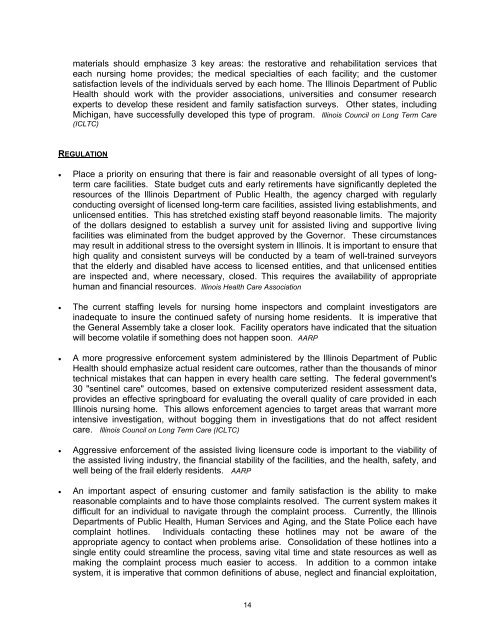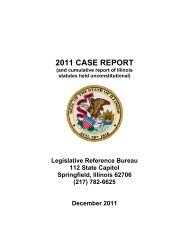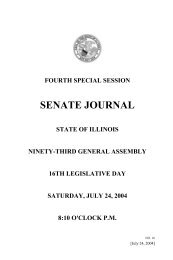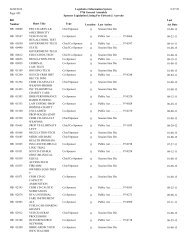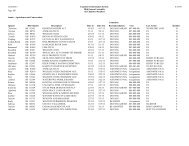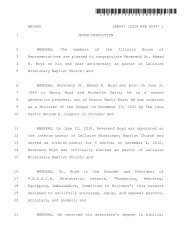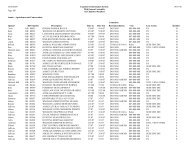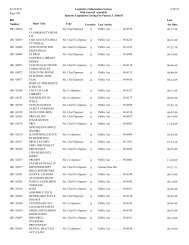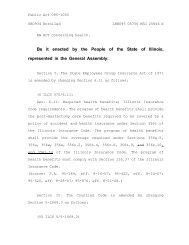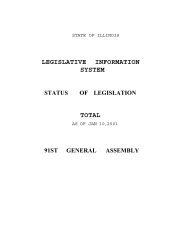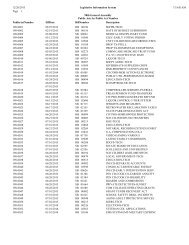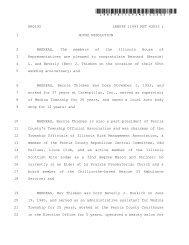Long-Term Care - Illinois General Assembly
Long-Term Care - Illinois General Assembly
Long-Term Care - Illinois General Assembly
You also want an ePaper? Increase the reach of your titles
YUMPU automatically turns print PDFs into web optimized ePapers that Google loves.
materials should emphasize 3 key areas: the restorative and rehabilitation services that<br />
each nursing home provides; the medical specialties of each facility; and the customer<br />
satisfaction levels of the individuals served by each home. The <strong>Illinois</strong> Department of Public<br />
Health should work with the provider associations, universities and consumer research<br />
experts to develop these resident and family satisfaction surveys. Other states, including<br />
Michigan, have successfully developed this type of program. <strong>Illinois</strong> Council on <strong>Long</strong> <strong>Term</strong> <strong>Care</strong><br />
(ICLTC)<br />
REGULATION<br />
• Place a priority on ensuring that there is fair and reasonable oversight of all types of longterm<br />
care facilities. State budget cuts and early retirements have significantly depleted the<br />
resources of the <strong>Illinois</strong> Department of Public Health, the agency charged with regularly<br />
conducting oversight of licensed long-term care facilities, assisted living establishments, and<br />
unlicensed entities. This has stretched existing staff beyond reasonable limits. The majority<br />
of the dollars designed to establish a survey unit for assisted living and supportive living<br />
facilities was eliminated from the budget approved by the Governor. These circumstances<br />
may result in additional stress to the oversight system in <strong>Illinois</strong>. It is important to ensure that<br />
high quality and consistent surveys will be conducted by a team of well-trained surveyors<br />
that the elderly and disabled have access to licensed entities, and that unlicensed entities<br />
are inspected and, where necessary, closed. This requires the availability of appropriate<br />
human and financial resources. <strong>Illinois</strong> Health <strong>Care</strong> Association<br />
• The current staffing levels for nursing home inspectors and complaint investigators are<br />
inadequate to insure the continued safety of nursing home residents. It is imperative that<br />
the <strong>General</strong> <strong>Assembly</strong> take a closer look. Facility operators have indicated that the situation<br />
will become volatile if something does not happen soon. AARP<br />
• A more progressive enforcement system administered by the <strong>Illinois</strong> Department of Public<br />
Health should emphasize actual resident care outcomes, rather than the thousands of minor<br />
technical mistakes that can happen in every health care setting. The federal government's<br />
30 "sentinel care" outcomes, based on extensive computerized resident assessment data,<br />
provides an effective springboard for evaluating the overall quality of care provided in each<br />
<strong>Illinois</strong> nursing home. This allows enforcement agencies to target areas that warrant more<br />
intensive investigation, without bogging them in investigations that do not affect resident<br />
care. <strong>Illinois</strong> Council on <strong>Long</strong> <strong>Term</strong> <strong>Care</strong> (ICLTC)<br />
• Aggressive enforcement of the assisted living licensure code is important to the viability of<br />
the assisted living industry, the financial stability of the facilities, and the health, safety, and<br />
well being of the frail elderly residents. AARP<br />
• An important aspect of ensuring customer and family satisfaction is the ability to make<br />
reasonable complaints and to have those complaints resolved. The current system makes it<br />
difficult for an individual to navigate through the complaint process. Currently, the <strong>Illinois</strong><br />
Departments of Public Health, Human Services and Aging, and the State Police each have<br />
complaint hotlines. Individuals contacting these hotlines may not be aware of the<br />
appropriate agency to contact when problems arise. Consolidation of these hotlines into a<br />
single entity could streamline the process, saving vital time and state resources as well as<br />
making the complaint process much easier to access. In addition to a common intake<br />
system, it is imperative that common definitions of abuse, neglect and financial exploitation,<br />
14


